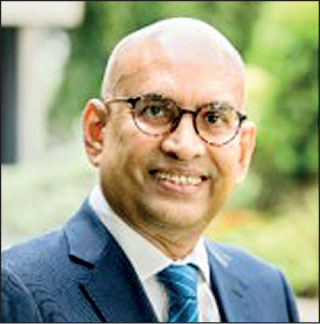Thursday Feb 19, 2026
Thursday Feb 19, 2026
Thursday, 13 October 2022 01:36 - - {{hitsCtrl.values.hits}}
 |
| Greece former Finance Minister Dr. George Papaconstantinou |
 |
| SLID Chairman Faizal Salieh
|
The Sri Lanka Institute of Directors (SLID) recently held a webinar titled ‘Sri Lanka’s economic crisis: Lessons from Greece’, featuring former Greece Finance Minister Dr. George Papaconstantinou.
The session drew several pertinent lessons from Greece’s own experience through its tumultuous period of unprecedented economic crisis in 2009-2018 and its road to recovery. The session was moderated by SLID Chairman Faizal Salieh. It had a 30-minute keynote speech by Dr. Papaconstantinou followed by a 30-minute Q&A discussion.
Dr. Papaconstantinou in his keynote said: “No two crises are the same. but there are many similarities such as warning signals, incidents, and unfortunately the same long and painful recovery periods.”
He spoke about the key learnings from the Greek experience, critical actions that are required from a political and economic sense, the roles of business, Government, and citizens in trying to find right solutions, short-term quick fixes vs long-term sustainability, and gave some broad recommendations that can be considered as Sri Lanka moves forward.
“In some of the key metrics such as debt/GDP, fiscal and current account deficit, you can see a lot of similarities between the crisis in Greece and in Sri Lanka, which also have a lot to do with the actual incidents of the crisis including accumulation of early warning signals and the failure to see the signals, rising deficits and debt to around 10% of GDP and triple deficits in 2009 (in the case of Greece),” said Dr. Papaconstantinou.
He added that the deeper causes behind the crisis was a combination of clientelism, a dysfunctional political system, and weak institutions that could not act as a counter-balance to check political decision making. Greece had three bail outs, by far the biggest in any country. Unsustainable debt levels, excessive public expenditure, massive tax evasion, huge credit expansion and wages outstripping productivity gains contributed to the decline in the economy’s competitiveness.
He said that the Greek crisis was longer than it should have been due to mistakes that were made which need to be avoided in Sri Lanka and that it is important to focus on the logic of the IMF bailout which is to provide funds until Sri Lanka regains access to international financial markets.
In order to continue getting these funds, a combination of fiscal consolidation, monetary and exchange rate policies, and reforms in product, labour, and financial markets must be implemented which can be extremely unpleasant.
He pointed out that fiscal consolidation would lead to recession but would eventually restore investor confidence and enable the return of long-term investors. He stressed the importance of long-term investors over the short-term opportunity-seekers for the economy’s long-term sustainability.
Dr. Papaconstantinou cautioned that the country risk immediately spilled over to the corporate sector and had stayed over a long period in Greece and they had a hard time tapping into international markets and had to grapple with issues such as acute forex shortages and flight of highly skilled human capital that was essential for rebuilding the economy. He said the Greek economy was still carrying the cost of lost human talent.
“A lesson that we learnt was that one should not delay taking painful decisions, which is important for politics as well, because the longer it waits, the tougher it becomes.” He stressed the need to move fast on the restructuring of debt. “Delay entails costs and typically, time is not in your favour. There is also a trade-off between short- and long-term transformation with IMF asking for a lot of short-term measures which makes it harder to have long-term reforms.
“It is important to push for long-term transformation and growth potential of the country. In the private sector, when the bubble bursts there will be many losses and very few wins,” he added. “The crisis inevitably entails political polarisation, and even good companies can go bust. That’s where the Government should step in and support them.”
Speaking of the role of the citizens, business, and Government, he said: “Crises are transformative, dramatic and tend to completely upend a society, politics and business and often go through the five stages of grief – denial, anger, bargaining (Sri Lanka’s current stage), depression, and acceptance. Crises consume governments.
“It is important to keep the political climate non-toxic helping to keep the crisis duration shorter as in Portugal and Ireland and elites must also take the pain. If they are sheltered, it is going to prolong the crisis. Social partners need to be part of the solution and should have a seat at the table even with IMF discussions on what needs to be done and often IMF also gets it wrong as their recipes are not necessarily useful for every country.”
“The pain which accompanies every crisis needs to be apportioned in a socially fair manner. Everyone will suffer but the vulnerable will suffer more. If it is seen that business and political elites were carving out a secure environment, it will backfire. The Government needs to be fully accountable with maximum publicity, honesty, and openness. Greece passed a law where every Government expense is published on the web, if it is not, then it is not legal.
“Also, a realistic fiscal path needs to be determined, if not it could lead to a vicious circle and lead to economic collapse which happened in Greece. Embrace the necessary reforms whether they are public sector, product/market reforms, opening up markets, professions or reforming SOEs, and privatisation. It is important for the Government to stand firmly behind these rather than as an afterthought to fiscal consolidation.
“Finally, it is important to get the narrative right, recognise the reasons how you got to this situation and who is accountable. In Greece, we blamed the IMF, the Germans for being too tough and blamed everyone else except for ourselves, the Government and the business community for making some wrong decisions like relying too much on the Government and not standing on its own feet,” he concluded.
In response to a question from the moderator that the usual criticism levelled against IMF was that it has a “one-size-fits-all” prescription for remedy and how it was managed in Greece, Dr. George explained that the IMF is now different from the Asian crisis times.
“It is a different beast; they do actively try to be more understanding of the social situation and they are open to keeping a recipe of measures that is balanced and protects the vulnerable and they are open as long as you got the data to back it up and arguments to exchange some measures for others if you can show them that a specific measure is detrimental.
“At the end of the day, they have the money and therefore the veto rights, so it’s a delicate situation and they have to be convinced of your sincerity and competence. The conversation with the IMF does not finish with the signing of the agreement.”